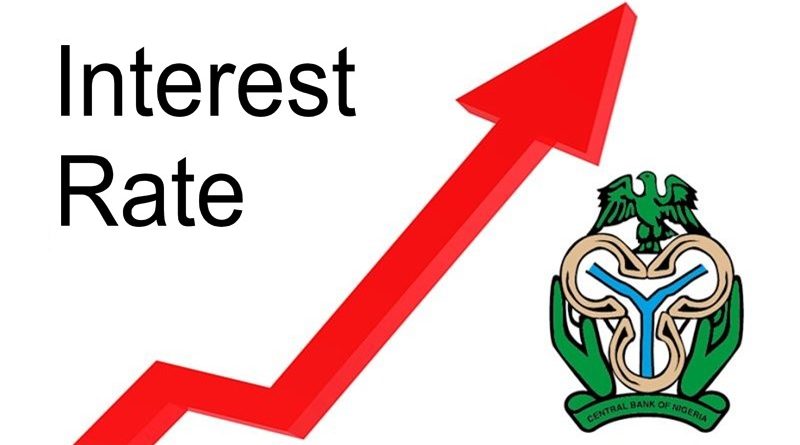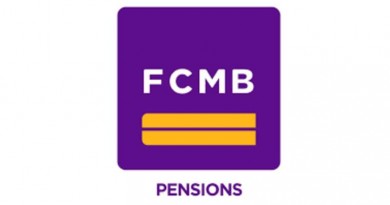Central Bank increases interest rate to 22.75%
The monetary policy committee (MPC) of the central Bank of Nigeria held their February 2024 meeting with Twelve (12) members of the committee in attendance. The highlight of the meeting is the increase in the monetary policy rate (MPR) or minimum lending interest rate to 22.5%, an increase of 400 basis points. below is the summary of the decisions taken by the MPC
- MPR hiked by +400bps to 22.75%
- Asymmetric corridor of the MPR adjusted to +100 / -700bps
- CRR raised to 45% from 32.5%.
- Retained liquidity ratio at 30%.
According to data from the CBN, this is the highest MPR recorded since 2006. The increase in the MPR is intended to reduce the excess liquidity of the naira. The decision to raise the MPR was mainly influenced by the current headline inflation rate, which stands at 29.9% year-on-year, and the ongoing pressures on the exchange rate. The monetary policy committee (MPC) acknowledges the delicate balance between stimulating output growth and controlling inflation, but emphasizes that sustainable economic expansion depends on maintaining low and stable inflation levels.
In considering whether to maintain the current stance, the MPC noted that previous rate hikes had partially mitigated inflationary pressures but had not achieved the desired outcome. Concerns were raised about the potential persistence of inflationary trends in the medium term, which could pose additional challenges if not addressed. As a result, there was a strong argument in favor of a significant rate hike to alleviate mounting inflationary pressures.
CBN staff projections indicate that inflation is expected to continue rising in the near term before gradually declining, in line with our own projections. We anticipate that inflation will peak in the second quarter before gradually receding, assuming all other factors remain constant.
The CBN governor highlighted several factors contributing to the rise in inflation, including exchange rate pass-through, increasing energy costs, high fiscal deficit, and ongoing security challenges in major food-producing areas. There is also a risk of domestic inflation being affected by trickle-down effects from the global economy, particularly in areas of geopolitical risk and trade disruptions.
Additionally, the CBN provided GDP forecast figures for 2024. The CBN estimates GDP growth at 3.38%, while the FGN projects a slightly higher growth rate of 3.88%. In comparison, our own projection for GDP growth stands at 3.0% year-on-year.
The moderation of inflationary and exchange rate pressures remains a top priority for the Monetary Policy Committee (MPC) in relation to the ongoing discussion on exchange rates. The MPC acknowledges the importance of implementing measures to enhance investor confidence and attract capital inflows. The Central Bank of Nigeria (CBN) governor has mentioned an improvement in external reserves, attributing it to reforms in the foreign exchange (fx) market and an increase in oil production, among other factors. According to data available on the CBN website, gross official reserves have seen a slight increase of 0.5% month-on-month.
The CBN governor has emphasized that the naira is undervalued and internal calculations have been conducted to support this claim. In cases where a market is not functioning effectively, distortions are inevitable. The CBN is currently investigating these distortions and aims to provide constant clarity and transparency to address any lack of clarity that may contribute to such distortions.
In terms of the NAFEM window, it is worth noting that foreign portfolio investors (FPIs) accounted for 41.3% of total foreign exchange inflow in February ’24, which is significantly higher compared to their 7.2% contribution in February ’23. It is suspected that a portion of the recorded FPI inflow may be attributed to the two NTB auctions held this month, indicating the responsiveness of FPIs to investment opportunities in the Nigerian financial market.
It is crucial for Nigeria to avoid failed interventions, and therefore, effective implementation of fiscal policies by the relevant authorities is equally important. This is necessary to address the rising inflation and alleviate the current economic challenges associated with the increasing cost of living. The CBN governor has highlighted that sustainable fiscal policy impact is more achievable in an economy with a tax-to-GDP ratio of approximately 30%, in contrast to Nigeria’s current ratio of 7%.
In recent weeks, a series of circulars were discussed during the MPC meeting. These circulars were carefully considered and not impulsive reactions, as confirmed by the CBN governor. To provide you with more information, we have outlined the policy actions that were based on these circulars.
The next MPC meeting is scheduled to take place next month, specifically on the 25th and 26th of March 2024.
Here is an overview of the policy actions implemented by the CBN, which have influenced monetary policy since the appointment of Governor Cardoso and the current deputy governors:
AUGUST 2023
RESUMPTION OF OPEN MARKET OPERATION (OMO)
The reintroduction of OMO auctions has allowed the CBN to effectively manage liquidity and attract investments through competitive interest rates. In 2023, there were four auctions, and in 2024, there have been three auctions so far. The total sales in 2023 amounted to N728 billion, with an average stop rate of 13.3%. Additionally, the three auctions held in January and February 2024 recorded total sales of N1 trillion, with an average stop rate of 13.8%, indicating sustained high demand. Notably, the average yield in the secondary market for OMO bills increased by +723 basis points year-on-year, reaching 18.1% as of 26th February 2024.
OCTOBER 2023
CBN HALTS INTERVENTIONS
In September 2023, the CBN decided to halt its interventions in the foreign exchange market. Prior to this decision, the CBN’s interventions accounted for an average of 7% of the total foreign exchange inflow into the NAFEM window. However, on 16th February, the CBN injected approximately USD 180 million into the NAFEM window, representing 34% of the total foreign exchange inflow.
FX BAN ON 43 ITEMS LIFTED
The CBN lifted the ban on 43 items that were previously prohibited from accessing the NAFEM market. However, this action had a minimal impact on the value of the Naira against the USD.
In October 2023, the removal of the N2bn daily limit on funds placed at the Standing Deposit Facility (SDF) window allowed the CBN to manage system liquidity effectively. Deposits in the SDF window increased significantly by +272% to N2.16trn from N791bn in September 2023.
In February 2024, after an independent forensic audit, USD2.4bn FX claims were found to be invalid, reducing the total backlog of fx obligations owed by the CBN to USD4.6bn from the initially reported USD7bn. USD2.3bn has been settled, signaling a commitment to resolving FX repartition issues and enabling the CBN to focus on direct market intervention to regulate exchange rates. Efforts to address underlying structural issues contributing to FX volatility are crucial for enhancing the resilience of Nigeria’s FX market in the long term.
In January 2024, the harmonization of reporting requirements on FX exposures of banks mandates that the Net Open Positions (NOP) must not exceed 20% short or 0% long (previously 10% long) of the bank’s shareholders’ funds unimpaired by losses. This calculation must be done using the Gross Aggregate Method, with specific templates provided by the CBN for daily and monthly NOP and Foreign Currency Trading Position (FCT) calculations. The circular aims to mitigate excessive FX exposures that could strain liquidity and exacerbate volatility.
The circular has eliminated the restrictions on the allowable limit of foreign exchange (FX) quoted by international money transfer operators (IMTOs). Previously, IMTOs were only allowed to quote within a range of -2.5% to +2.5% around the previous day’s closing rate. However, with the new circular, IMTOs can now quote based on the prevailing market rate and on a willing seller, willing buyer basis.
This change is significant as it promotes a more flexible and transparent FX market. By allowing IMTOs to quote based on prevailing market conditions, it enhances liquidity and facilitates the efficient allocation of FX resources. Additionally, it encourages increased competition among IMTOs, leading to innovation and efficiency improvements in FX transfer services. Ultimately, this benefits consumers by lowering costs and improving accessibility to FX.
In February 2024, the Cash Reserve Requirement (CRR) framework implementation guidelines will be put into effect. The circular states that the Central Bank of Nigeria (CBN) will cease daily CRR debits and adopt an updated CRR mechanism. This new mechanism aims to help banks plan, monitor, and align their records with the CBN. The determination of the deposits subject to CRR debits will follow a two-phase process.
In Phase 1, the CRR rate of 32.5% will be applied to increases in banks’ weekly average adjusted deposits. In Phase 2, a CRR levy of 50% of the lending shortfall will be enforced for banks that fail to meet the minimum loan to Deposit Ratio (LDR).
Regarding the foreign exchange rate for import duty assessment, the circular advises the Nigeria Custom Service and other related parties to adopt the closing FX rate on the date of the opening Form M for the importation of goods. This FX rate will be used for import duty assessment and will remain valid until the date of termination of the importation and clearance of goods by importers. This measure aims to enable effective planning and reduce uncertainties caused by daily exchange rate fluctuations.
The revised regulatory and supervisory guidelines for Bureau De Change operations in Nigeria significantly improve the regulatory framework for BDCs as part of ongoing reforms in the FX market. These guidelines update permissible activities, licensing requirements, corporate governance, and Anti-Money Laundering/Combating the Financing of Terrorism (AML/CFT) provisions for BDCs, as well as introduce new record-keeping and reporting requirements, among other changes.
Enhancing the regulatory framework for BDCs is expected to positively impact exchange rate stability by increasing the efficiency of FX transactions. Encouraging adherence to regulatory standards and improving market transparency should lead to a more organized FX market, ultimately helping to reduce exchange rate volatility.
Following the implementation of the Price Verification System (PVS) to address over-invoicing of imports and under-invoicing of exports, the circular has adjusted the allowable deviation limit for exports and imports to -15% and +15% of global average prices, respectively. This adjustment considers global inflation and other relevant factors.
Effectively controlling over-invoicing of imports and under-invoicing of exports can help preserve Nigeria’s FX reserves by preventing unnecessary outflows of foreign currency. This can also support a more balanced trade account by ensuring that export earnings accurately reflect the value of goods and services sold abroad, thereby contributing to Nigeria’s macroeconomic stability.
The circular now requires all Authorized Dealer Banks to pay out Personal Travel Allowance (PTA) and Business Travel Allowance (BTA) exclusively through electronic channels, such as debit or credit cards, with cash payments prohibited.
Electronic channels utilized for PTA/BTA payouts play a crucial role in enhancing transparency within FX transactions through the establishment of a digital footprint that simplifies the process of tracking and monitoring funds. The transition towards electronic channels presents a multitude of advantages, although there are potential obstacles related to infrastructure preparedness, cybersecurity, and user education.
The guidelines for foreign currency cash pooling on behalf of international oil companies in Nigeria stipulate that banks are permitted to pool cash for IOCs, up to a maximum of 50% of the repatriated export proceeds initially. The remaining 50% can be repatriated after a period of 90 days from the influx of the export proceeds. This measure is implemented to mitigate any adverse effects on domestic FX liquidity.




